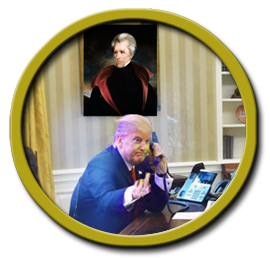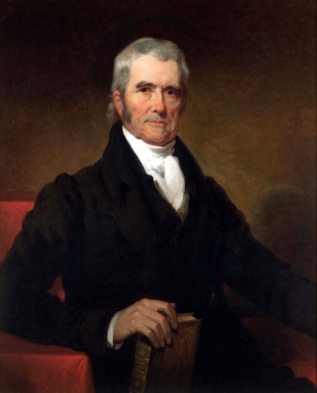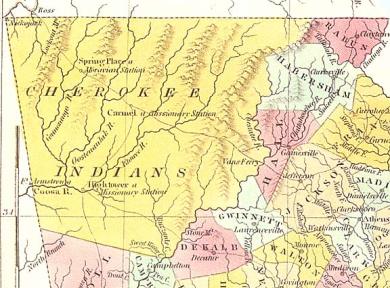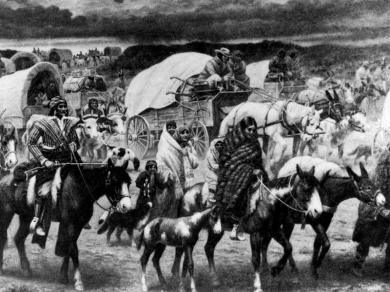
“John Marshall has made his decision; now let him enforce it.”
UNDERMINING THE CONSTITUTION
- “There is no precedent to support this claimed unreviewability, which runs contrary to the fundamental structure of our constitutional democracy,” the court said in the ruling against Trump. The President can make a wise choice and withdraw his executive action.
- Andrew Jackson defied Chief Justice John Marshall’s prohibition against moving the Cherokees out of Georgia to west of the Mississippi. Trump can do the same.
The wise choice would be to withdraw the misbegotten executive order, rewrite  a new order that would, presumably, pass the sniff test, and move on.
a new order that would, presumably, pass the sniff test, and move on.
OR, PRESIDENT TRUMP could confront the Courts’ authority by going to the SCOTUS, losing and then implementing the order anyway “in the interest of national security.” Trump’s precedent would be the actions of Andrew Jackson, perhaps the worst President in American history.

John Marshall
This second choice fits well with the philosophy of neofascism expounded by Trump’s advisors Steve Bannon and Steve Miller. Both have talked about war and the need to rewrite the Constitution. The Supreme Court is an ideal target for these radicals because the role of the court in interpreting the Constitution is not in the Constitution itself!
Thirty years prior to Andrew Jackson’s defiance of the Supreme Court, the court under its first Chief Justice , John Marshall, issued the most important opinion in the history of the bench. In Marbury v. Madison, Chief Justice John Marshall ruled that the Supreme Court is vested with the power of judicial review. Since Marbury, SCOTUS has had the ability to determine that a law is at odds with the US Constitution and therefore invalid. After all, if the courts cannot decide that a law is incongruous with the Constitution then who can?
Today we view the power of judicial review as the basis of the balance of power under the unique American system of government.
Jackson’s quote ““John Marshall has made his decision; now let him enforce it,” contains President Andrew Jackson’s retort to the 1832 decision in Worcester v. Georgia. In Worcester Marshall’s court struck down a Georgia law that imposed regulations on the comings and goings of white people. American citizens. The tone of Trumps’s tweet echoes his predecessor:

Relevant to the current case, Jackson’ s government did not consider Native Americans as American citizens, In Jackson’s view, the Cherokee had no rights …. they were foreigners like Syrian refugees under Mr. Trump.
Establishing judicial review made the judicial branch highly relevant. The decision strengthened the separation of powers between the three branches and made the Constitution the cornerstone of lawmaking throughout the country. But the Court had to walk a fine line in establishing judicial review. At the time, the Supreme Court was a fledgling entity that had little relevance and whose daily functions were at the whim of whatever party was in power.
In 1800 Thomas Jefferson defeated John Adams to become the third President of the United States. The two were bitter rivals as Adams was the leader of the Federalist Party and Jefferson was the leader of the Democratic-Republican party. Prior to leaving office, Adams appointed many like-minded people to federal courts across the country as a means of preserving his party’s influence on policy. However, the letter of commission for one William Marbury for Justice of the Peace of the District of Columbia was not delivered to him prior to Adams leaving office and Thomas Jefferson had no intention of delivering it.
That gave way to William Marbury filing a lawsuit under the Federal Judiciary Act of 1789 to force Jefferson’s Secretary of State, James Madison, to give him his commission. The Act allowed him to file the suit directly in the Supreme Court, where Chief Justice John Marshall was waiting with open arms. This was the opportunity he had been waiting for that would allow him to make the Supreme Court much more relevant.
But the situation was tricky. Although Marshall was political allies with John Adams, he realized he needed to reach a decision that President Jefferson would want to enforce. Since the Supreme Court at that time had a fraction of the significance it has today, the president was largely free to ignore the ruling of the Court without suffering political or popular harm.
Marshall began his opinion by stating that William Marbury was entitled to his commission; Secretary of State Madison had no discretion to withhold carrying out the lawful appointment of Marbury as Justice of the Peace. However, in a stroke of genius, Marshall dismissed the claim on procedural grounds, stating that the US Constitution did not give Congress the authority to enact a law that allowed William Marbury’s type of lawsuit to be filed directly in the US Supreme Court; such a suit would have to work its way up the court system prior to reaching the Supreme Court. Marshall was able to satisfy his political party by declaring Madison’s actions to be improper while simultaneously delivering a final ruling that pleased Jefferson enough to make him want to enforce it.
Fast forward to 1832. Having firmly established judicial review with the ruling in favor of Jefferson’s administration in Marbury v. Madison, Chief Justice Marshall was free to rule against the new sitting president, Andrew Jackson, right? Well perhaps thirty years isn’t enough time to let something set, especially when you’re dealing with someone like Andrew Jackson.
Georgia VS the Cherokee Nation
Throughout the 1820’s Georgia worked tirelessly to remove the Cherokee Indians from their lands in the northern part of the state. It enacted laws that extended its jurisdiction over Cherokee territory, acquired tribal lands, and attempted to redistribute that land to non-native residents. Andrew Jackson was elected president in 1828 and joined Georgia in its quest to remove the Cherokee and other Native Americans from their land.
In 1831 the Cherokee Nation challenged the Georgia laws in the US Supreme Court. Similar to the procedural grounds upon which Marbury v. Madison was dismissed decades earlier, the Court declined to the hear the case on its merits. In Cherokee Nation v. Georgia, the Court held that, since the Cherokee Nation was a “domestic, dependent nation” and not a foreign nation, the Court lacked jurisdiction.
But a man named Samuel Worcester would throw a wrench in that decision. A minister from Vermont who worked as a missionary with the American Board of Commissioners for Foreign Missions, Worcester was assigned a post within the Cherokee Nation and took up residence in the Cherokee capital of New Echota. Worcester not only taught the Cherokee the words of the Bible, but advised them of their legal rights. Unsurprisingly, this sparked outrage from Georgia leaders as they saw Worcester as a linchpin in the Cherokee resistance. This prompted the state to enact licensing laws regulating how white people moved to and from the Cherokee lands. As a white person residing in Cherokee land without a license, Worcester and several other missionaries were retrieved from Cherokee land and imprisoned.
This resulted in another showdown in the US Supreme Court. In Worcester v. Georgia, the Court seemingly reversed Cherokee Nation v. Georgia, holding that Indian nations were sovereign nations with inherent natural rights to land. As the Constitution grants the federal government the exclusive power to negotiate treaties with foreign nations, Georgia’s laws were in direct conflict with the US Constitution and with existing treaties. The Court even cited previous pieces of Georgia legislation, including the Act of Cession of 1802, showing that the state had acknowledged the idea that Indian nations have a full right to the territory they occupy and that this right can only be extinguished in negotiation with the government of the United States.
Enter Andrew Jackson. Two years prior to the Worcester decision, he successfully convinced Congress to pass the Indian Removal Act. Despite his strong belief in states’ rights and the power of each state to govern its own jurisdiction, the Act created a scheme which gave the president jurisdiction over Indian-state relations. This included the right to grant land west of the Mississippi River to Native Americans following negotiations with the tribes for their removal from eastern areas. Ultimately, Jackson wanted to remove the Native Americans from their land regardless of whether the means were in accordance with his own political beliefs. Unsurprisingly, when the Worcester decision was announced Jackson wasn’t too pleased.
“John Marshall has made his decision; now let him enforce it.”
Though President Jackson’s exact words were a bit different, the sentiment remained. Enforcing the ruling would mean not only deviating from his own ideology, but alienating a state that shared his core beliefs. So he decided to undermine the separation of powers and ignore the ruling. Without the president’s enforcement of the Supreme Court’s ruling, the opinion largely meant nothing. Samuel Worcester remained imprisoned in Milledgeville and the militia of Georgia was free to encroach on Cherokee land.
The Worcester opinion should have given the Native Americans much more leverage in future negotiations with the federal government. The decision, after all, established some degree of sovereignty and revoked the states’ ability to take part in such negotiations. However, it had little effect since neither the President of the United States nor the State of Georgia showed any acknowledgement of the ruling. Subsequently, in 1835 the Cherokee Nation signed the Treaty of New Echota which would effectively remove them from Georgia. The US Army promptly initiated the Trail of Tears, forcibly relocating over 15,000 Native Americans from Georgia to Oklahoma. Over 4,000 lost their lives on the journey.
Eventually the Georgia licensing law was repealed by the Georgia legislature after generating a public outcry over the continued imprisonment of missionaries and at the behest of new Governor Wilson Lumpkin.
While the Supreme Court has historically applied different theories of sovereignty based on the issue, the underlying idea of Worcester remains intact: any diminution in sovereignty is reserved as an issue for the federal government, not the states. A state cannot interfere with internal tribal affairs unless the federal government has granted such authority; whether this power has been granted is a decision for a federal court.
Ultimately, the actions of President Jackson to not recognize the opinion in Worcester had profound implications for Native Americans and for Georgia. Much of our lands in the Southeast and throughout the country bear the names of Native Americans and, being as such, these placemarks offer glimpses into a troubled yet rich history and lessons we should’t forget.
In the end, Andrew Jackson’s story reveals the ease at which the foundation of our governmental structure can be eroded. One person, in a powerful position, deciding to challenge the political and legal norms that we’ve come to rely on can have a profoundly negative impact on the integrity of our legal and political system.



